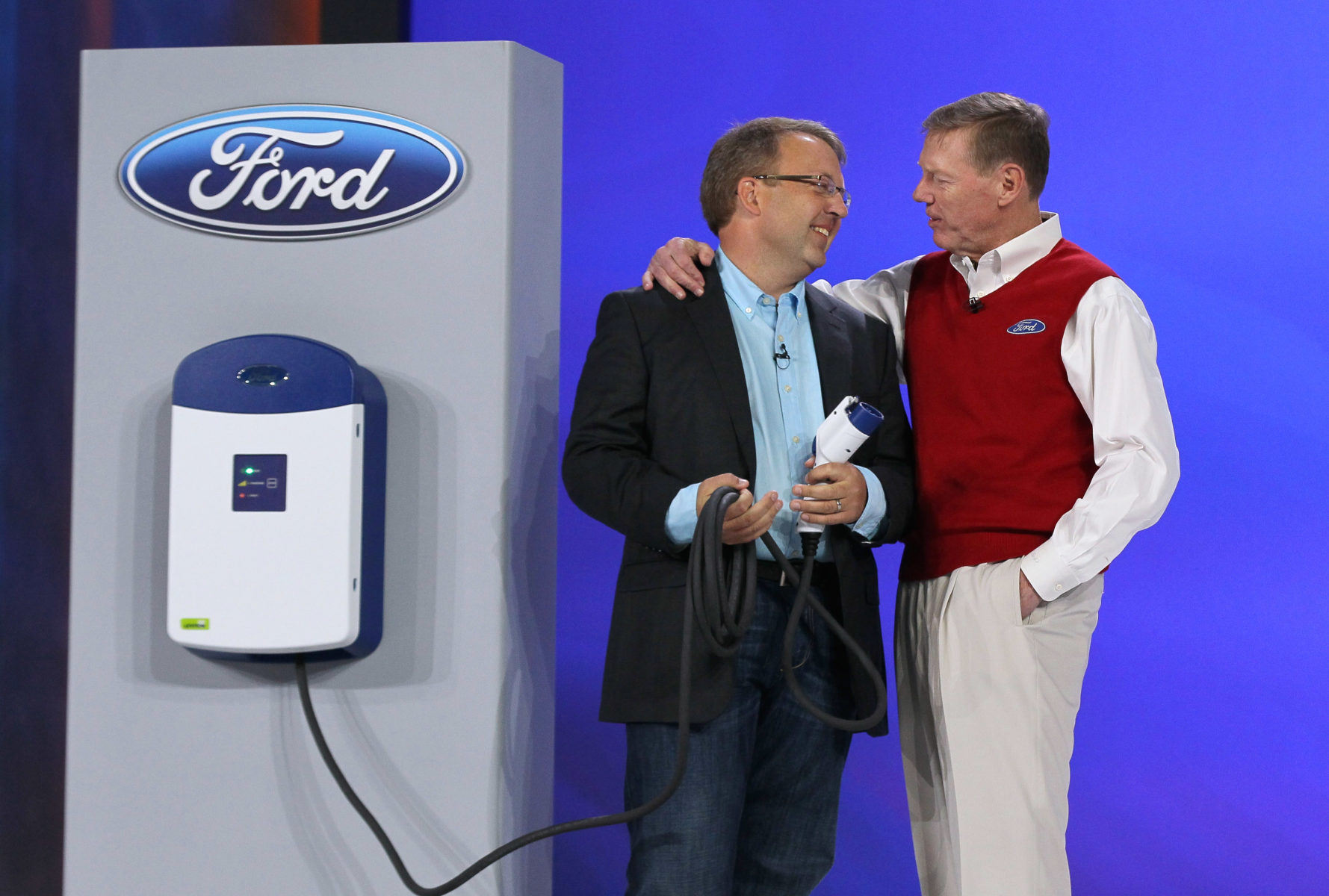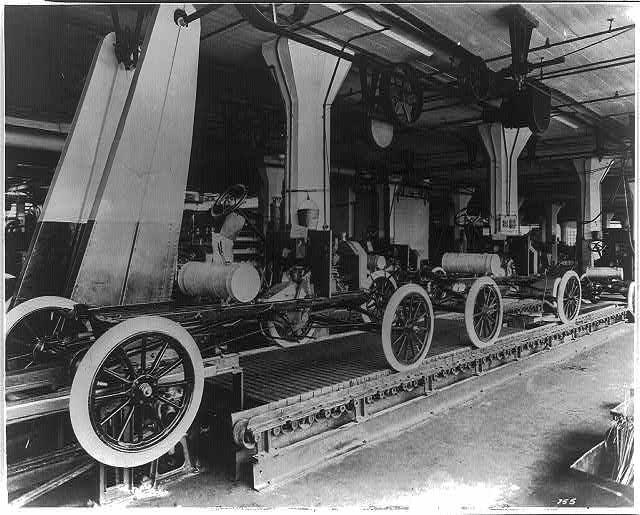

Ford is out with a new TV ad, serving heaping slices of Americana while touting the company’s purported climate commitments. Over classic newsreel footage of the Ford Highland Park Plant, built in 1910, with a gravelly voice-over from actor Bryan Cranston, the commercial declares, “You don’t become a 117-year old automaker in this country by refusing to change.”
“The Ford Motor Company does not resist, deny, or ignore change. We pledge to make our most iconic vehicles electric. To use 100% renewable energy across all global manufacturing plants by 2035. To stand for lower greenhouse gas emissions.”
The spot creates the impression of an industrial powerhouse that’s seen the light and is doing its part for the green movement—that times are a-changin’. What it doesn’t say is that for most of the past decade, Ford strenuously resisted the transition to electric vehicles while undermining strong climate action.
Through its lobbying efforts and that of the automakers’ trade association it funds, Ford worked behind the scenes with the Trump administration to weaken vehicle emissions standards. Now that Biden-Harris will take office and likely reinstate the Obama-era rules that Trump rolled back, Ford is changing its tune. The ad’s gauzy shots of workers tossing hay bales off the back of a pickup truck and vistas in the American West belie Ford’s role in a decade of delay on climate.
A recent investigation by E&E News revealed that like Exxon, Ford and General Motors knew about the effects of catastrophic climate degradation 50 years ago, but invested for decades in lobbying to undermine emissions standards. The Big Two automakers contributed to the spread of disinformation by contributing hundreds of thousands of dollars to conservative think tanks like the Competitive Enterprise Institute and American Enterprise Institute that disputed the scientific consensus on global warming.

The centerpiece of automobile emissions regulations for the past decade has been the Corporate Average Fuel Economy, or CAFE, standards. President Obama identified them as an area of focus in early March 2009, and after wrangling and changes, his administration announced an agreement in July 2011 with thirteen large automakers to ramp up fuel efficiency by 5% every year. The Atlantic staff writer Robinson Meyer looked back at them earlier this year, writing, “The rules had, in a word, worked: They had pushed the country’s fleet-wide fuel economy to an all-time high, prevented millions of tons of carbon from blanketing the atmosphere, and saved consumers hundreds of billions of dollars at the pump. They were also one of the most consequential climate-change protections in American history.”
But behind the scenes, Ford and other automakers—particularly Fiat Chrysler, Daimler, BMW, Toyota, and GM—have been key opponents of emissions cuts since the December 2015 Paris Agreement on climate, according to an October 2019 report released by the UK charity InfluenceMap. The researchers’ analysis was drawn from 250 biggest investor-owned industrial corporations and trade associations, from automakers like Ford to utilities like Southern Company to fossil fuel giants like ExxonMobil and Chevron. Across tens of thousands of PR statements, policy announcements and lobbying disclosures, the full report gave Ford a climate score of -24, the same as Occidental Petroleum. Researchers wrote of the automakers’ lobbying against climate policy, “This is the result of a strategy to control and delay the regulatory agenda on vehicle emissions and electric vehicles.”
After the surprising outcome of the 2016 presidential election, automakers had an anti-environmentalist in the White House and a GOP-controlled Congress, with the oil and gas industry having contributed 7x as much to Republican candidates as to Democrats. Ford’s hypocrisy in colluding with Trump to loosen fuel economy rules did not go unnoticed. In January 2018, the watchdog groups Public Citizen, Sierra Club and others crashed the Washington Auto Show with a projection that called out Ford for working with the Trump administration to undo the CAFE standards:
At the 2019 auto show, Public Citizen activists and other protestors roamed nearby in T-Rex suits to draw attention to Ford’s behind-the-scenes lobbying against emissions regulations while portraying themselves publicly as climate-conscious.
In 2018, Ford announced an $11 billion plan to get more electric vehicles to market in 2022, which will include a version of the popular F-150 truck, but that doesn’t mean they plan on sunsetting their heavy fossil-gas-guzzlers. By 2026, Ford and General Motors plan to make 5 million gas-powered trucks and SUVs to only 320,000 electric vehicles, which would be just 5% of their total production in North America.
Some automakers were ambivalent about Trump’s gutting of the fuel efficiency improvements, having worked within the rules for years, so the rollback process was somewhat delayed. But Trump had staked himself as anti-regulation, and in late March of this year the rollback was finalized. California vowed to defend its higher standards. The push to roll back protections never helped realize Trump’s pledges to revitalize American manufacturing—Meyer writes that GM employs 5,000 fewer people than they did in 2016, and has seen its valuation slashed by over one-third.
Biden is expected to roll back the Trump rollback on fuel standards, but Ford’s political arm still made unmistakable moves to signal its opposition to climate action by making donations last month to both Republican candidates in the Senate runoffs in Georgia—$5,000 to Kelly Loeffler and $1,000 to David Perdue. If they win and the Senate remains in Republican control under Majority Leader Mitch McConnell, the U.S. is unlikely to enact adequate legislation on climate to meet the Paris Accord targets, as Ford called for again recently with other huge corporations.
Meanwhile, the automakers’ trade association of which Ford is a member, the Alliance for Automotive Innovation, has reported nearly $3.6 million in lobbying this year, according to the Center for Responsive Politics, and is calling for government funding for electric vehicles after a decade of slow progress. A recent study showed that 90% of light vehicles in use would need to be electric by 2050 to keep the U.S. in line with global climate goals and the Paris Accord, requiring new car sales to be all-electric by 2035. But Ford’s projections expect one-third of vehicle sales globally by 2030 to be E.V.s. Britain is leading the way in the G7 by announcing it will ban new petrol-powered car and van sales starting in 2030; Paris plans to do so by the same date.
Despite Ford’s American-imagery ad, the U.S. is not on track to meet its Paris Accord targets, and staying in bounds will be harder with gasoline-powered SUVs still being sold after 2030. Decarbonization will also require massive investment in public transit, and it’s doubtful that the auto industry’s lobbyists are pushing for that in their meetings with the Senate Transportation Committee. Los Angeles, Austin, and West Hollywood are signatories to the Fossil Fuel Free Streets Declaration, which will procure E.V.s and has set the goal to “transition away from vehicles powered by fossil fuels.” More U.S. cities could join and tell Ford they’ll be moving polluting vehicles off their streets by 2030.
Also this week on Sludge: Seattle’s unique public campaign financing system of “democracy vouchers” is showing great results in increasing donor participation and diversifying the donor base. Follow us on Twitter for more muckraking, and get our free newsletter of money-in-politics news.
Photo: Former Ford President and CEO Alan Mulally (right) talks with Ford Manager of Global Electrification Infrastructure Mike Tinskey after demonstrating a new charging station during a keynote address at the 2011 International Consumer Electronics Show in Las Vegas, Nevada. (Justin Sullivan / Getty Images)
